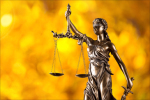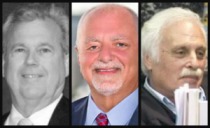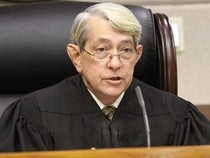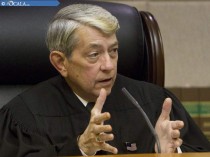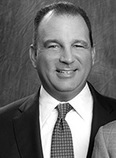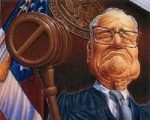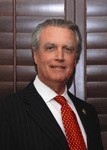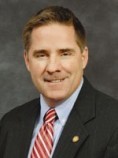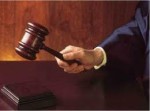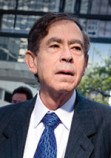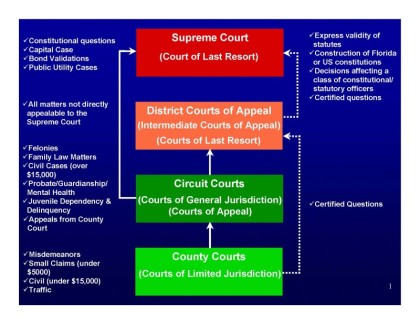Florida Judicial Qualifications Commission (JQC)
The Judicial Qualifications Commission (JQC) is an independent agency created by the Florida Constitution solely to investigate alleged misconduct by Florida state judges. It is not a part of the Florida Supreme Court or the state courts and operates under rules it establishes for itself.
Authority for The Judicial Qualifications Commission is found in the Florida Constitution, Article V Judiciary, Section 12 Discipline; removal and retirement.
Constitution Of The State of
Florida
As Revised in 1968 and Subsequently Amended
Florida Judicial Qualifications Commission - JQC
Post Office Box 14106
Tallahassee, FL 32317
(850) 488-1581
The Florida Statutes
43.20 Judicial Qualifications Commission.—
(1) PURPOSE.—The purpose of this section is to implement s. 12(b), Art. V of the
State Constitution which provides for a Judicial Qualifications Commission.
(2) MEMBERSHIP; TERMS.—The commission shall consist of 15 members. The members of the commission shall serve for terms of 6 years.
(3) VACANCIES.—An appointment to fill a vacancy shall be for the remainder of the term.
(4) SELECTION OF MEMBERS BY DISTRICT COURTS OF APPEAL JUDGES, CIRCUIT COURT JUDGES, COUNTY COURT JUDGES AND BOARD OF GOVERNORS OF THE FLORIDA BAR.—The members appointed
by the judges of the district courts of appeal, the circuit judges, the county court judges, and the Board of Governors of The Florida Bar shall be selected by not less than a majority of the
membership of the respective appointing groups.
(5) EXPENSES.—The compensation of members and referees shall be the travel expense or transportation and per diem allowance provided by s. 112.061.
Here Comes the Judge, in Cuffs
Here Comes the Judge, in Cuffs (Justice Network blog link)
In Broward County, Fla., Spate of Judges in D.U.I. Arrests (NYT)
The New York Times
By FRANCES ROBLES
June 27, 2014
MIAMI — Lawyers gawked from office windows last month when a BMW S.U.V. swiped a parked police cruiser in the parking lot of a courthouse in Fort Lauderdale, then slammed into a gate over and over again. A judge was at the wheel.
As lawyers used smartphones to snap pictures of the morning spectacle, Judge Lynn D. [Feig] Rosenthal became the third Broward County judge in six months to be arrested on charges of driving under the influence. A colleague, Judge Gisele Pollack, had been suspended five days earlier after getting arrested on a D.U.I. charge while already on leave for taking the bench intoxicated — twice.
Even for South Florida, where absurd news events are routine and the sheriff went to prison for corruption, the spate of judicial scandals has raised serious questions about whether the arrests in Broward are a bizarre coincidence or underscore a larger systemic problem. Read more - Justice Network blog
How Judges Are Disciplined for Misconduct
How Judges Are Disciplined for Misconduct
The Judicial Qualifications Commission is an independent agency created by the Florida Constitution solely to investigate alleged misconduct by Florida state
judges. It is not a part of the Florida Supreme Court or the state courts and operates under rules it establishes for itself. The JQC has no authority over federal judges or judges in other
states. Complaints against state judges must be filed in writing with the JQC, not with the Supreme Court or any other state court or judge. Neither the Supreme Court nor its Chief
Justice have any authority to investigate alleged misconduct by state judges or to investigate the JQC. Read
more
Pending JQC Cases Against Florida State Judges
Who is on the JQC?
There are 15 members of the JQC. Two must be district court of appeal judges chosen by all the judges of the 5 district courts. Two must be circuit court judges chosen by all the judges of the 20 judicial circuits. Two must be county court judges chosen by all the judges of the 67 county courts. Four must be registered voters who also are lawyers, chosen by the Board of Governors of The Florida Bar. The final five must be non-lawyers who are registered voters, chosen by the Governor.
JUDICIAL QUALIFICATIONS COMMISSION MEMBERS
Michael L. Schneider, Executive Director and General Counsel
Alexander J. Williams, Assistant General Counsel
Brooke S. Kennerly retired as JQC Executive Director, February 2014.
By Dan Christensen, BrowardBulldog.org
June 10, 2014
U.S. District Judge Middlebrooks, left, former Palm Beach State Attorney Peter Antonacci, center, and Palm Beach County Judge Barry M. Cohen
In unusual public criticism, a South Florida federal judge has accused the state’s Judicial Qualifications Commission of “bullying” that threatens the independence of the state’s judges.
U.S. District Judge Donald M. Middlebrooks, in a May 30 speech to lawyers in West Palm Beach, slammed the JQC for what he said was the agency’s misguided prosecution of Palm Beach County Judge Barry M. Cohen for speaking out against perceived legal injustices, including racial profiling.
“The JQC’s actions are wrong, and if continued, will damage the independence of the judiciary,” Middlebrooks said, according to a copy of his speech obtained by BrowardBulldog.org.
Noting it was “hard to fault the Florida Supreme Court because Judge Cohen agreed to the reprimand” to put the matter behind him, Middlebrooks nevertheless took to task Florida Supreme Court Chief Justice Ricky Polston. On April 29, Polston administered the high court’s public reprimand of Palm Beach County Judge Barry M. Cohen, calling it “a sad day for the entire judiciary.”
"Judge Cohen was reprimanded for speech – statements he made about matters of public concern – despite agreement that none of his rulings or decisions was ever adversely affected," said Middlebrooks, who titled his speech "A Sad Day for the Judiciary." Read more here, and in the PDF below.
Also see: Portrait of Injustice and
Corruption, Florida Supreme Court Chief Justice Ricky Polston, Thirteenth Circuit Judge Claudia Rickert Isom, and Florida Bar President Gwynne Alice Young.
By Dan Christensen, BrowardBulldog.org, June 10, 2014
Federal judge - ‘Bullying’ by Florida JQ[...]
Adobe Acrobat document [114.8 KB]
U.S. District Judge Donald M. Middlebrooks
A-Sad-Day-for-the-Judiciary.pdf
Adobe Acrobat document [89.6 KB]
How is the JQC Structured?
The JQC is divided into two panels, an "investigative panel" that acts much like a prosecutor, and a "hearing panel" that acts much like a panel of judges reviewing the case. Judges accused of misconduct often are represented by a private attorney.
JUDICIAL QUALIFICATIONS COMMISSION RULES
These rules apply to all proceedings before the Judicial Qualifications Commission involving the discipline, retirement or removal of justices of the Supreme Court, and judges of the District Courts of Appeal, Circuit Courts, and County Courts pursuant to Article V, Section 12 of the Constitution of the State of Florida, as amended, and removal or disqualification of members of the Commission. These rules shall be known as Florida Judicial Qualifications Commission Rules and may be abbreviated as "FJQCR." . . . .
Letter of Michael Schneider-JQC-ExDir-Ge[...]
Adobe Acrobat document [174.6 KB]
Code of Judicial Conduct, State of Florida
- Preamble Code of Judicial Conduct
- Canon 1. A Judge Shall Uphold the Integrity and Independence of the Judiciary
- Canon 2. A Judge Shall Avoid Impropriety and the Appearance of Impropriety in all of the Judge's Activities
- Canon 3. A Judge Shall Perform the Duties of Judicial Office Impartially and Diligently
- Canon 4. A Judge Is Encouraged to Engage in Activities to Improve the Law, the Legal System, and the Administration of Justice
- Canon 5. A Judge Shall Regulate Extrajudicial Activities to Minimize the Risk of Conflict With Judicial Duties
- Canon 6. Fiscal Matters of a Judge Shall be Conducted in a Manner That Does Not Give the Appearance of Influence or Impropriety; etc.
- Canon 7. A Judge or Candidate for Judicial Office Shall Refrain From Inappropriate Political Activity
- Application
- Opinions of the Judicial Ethics Advisory Committee
The Structure of the Florida Judicial System
http://www.ninja9.org/courtadmin/courg.htm
The Structure of the Florida Judicial Sy[...]
Adobe Acrobat document [34.0 KB]
Justice Teaching, Judicial Discipline and Accountability
JQC Case Studies
Judicial_DisciplineAccountability.pdf
Adobe Acrobat document [231.9 KB]
The Robing Room, where judges are judged.
____________________________________________________________
"In the American judicial system, few more serious threats to individual liberty can be imagined than a corrupt judge. Clothed with the power of the state and
authorized to pass judgment on the most basic aspects of everyday life, a judge can deprive citizens of liberty and property in complete disregard of the Constitution. The injuries inflicted may be
severe and enduring. Yet the recent expansion of a judge-made exception to the landmark Civil Rights Act of 1871, chief vehicle for redress of civil rights violations, has rendered state judges
immune from suit even for the most bizarre, corrupt, or abusive of judicial acts.’ In the last decade this "doctrine of judicial immunity" has led to a disturbing series of legal precedents that
effectively deny citizens any redress for injuries, embarrassment, and unjust imprisonment caused by errant judges...."
Judicial Immunity vs. Due Process: When Should A Judge Be Subject to Suit?,
Robert Craig Waters, Cato Journal, Vol.7, No.2 (Fall 1987).
RobeProbe - World's most trusted judge rating site!
RobeProbe - World's most trusted judge rating site!
RobeProbe is here!!! The only comprehensive website that allows lawyers and litigants to rate the judicial performance of judges and bankruptcy trustees in a civilized,
easy to use forum. RobeProbe will revolutionize the legal community and the courts. Did you ever walk into a courtroom totally prepared for your case, but completely unprepared for the curve balls a
judge could throw at you? Did you ever go to court knowing very little about a judge, and come out knowing how great or how terrible that judge is by just spending five minutes before him or her?
Well, with RobeProbe on your side you will be prepared for both your case and the judge--and you'll know the judge before you enter the courthouse. Read more
My JQC Scribd Collection - links to JQC complaints, etc.
Link to my JQC Scribd Collection
Judicial Qualifications Commission
List of 10 JQC complaints by Neil Gillespie
JQC complaints by Neil Gillespie.pdf
Adobe Acrobat document [1.7 MB]
- JQC Docket No. 15-631 James David Arnold
- JQC Docket No. 15-075 Hale Ralph Stancil
- JQC Docket No. 13627 Manuel Menendez Jr.
- JQC Docket No. 13527 Clauda Rickert Isom
- JQC Docket No. 12385 Claudia Rickert Isom
- JQC Docket No. 12554 Martha J Cook
- JQC Docket No. 13573 Martha Jean Cook
- JQC Docket No. 13421 Martha Jean Cook
- JQC Docket No. 11375 Martha Jean Cook
- JQC Docket No. 10495 Martha Jean Cook
- Plaintiff’s 4th Motion to Disqualify Martha J. Cook
- Affidavit to Impeach Sham Order of Martha J. Cook
- U.S. v Terry, Opinion, Honest Services Fraud
- Letter to Acting U.S. Attorney A. Lee Bentley, MD Florida
- Reply to JQC General Counsel Mr Schneider, re Confidentiality
- Reply to JQC Executive Director Brooke S. Kennerly,Failed to Lawfully Perform and Discharge Duties
- JQC General Counsel Michael Schneider, re misconduct
- Vexatious JQC Inquiry No. 02-487 of Gregory P. Holder
- Abuse of JQC Special Counsel, Lauri Waldman Ross
- JQC Gen. Counsel Michael Scheider, Monica Sierra complaint
JQC complaints by Neil Gillespie.pdf
Adobe Acrobat document [1.7 MB]
Law review by Robert Craig Waters
Judicial Immunity v Due Process, Robert [...]
Adobe Acrobat document [708.0 KB]
Law review by Frank H. Easterbrook
Whats So Special about Judges, Frank H. [...]
Adobe Acrobat document [683.8 KB]
Are JQC complaints lawfully confidential?
The JQC has authority, Article V, Judiciary, section 12, discipline, removal and retirement, Florida Constitution. Part (a)(4) reads "all proceedings by or before the commission shall be confidential". This suggests present tense. Therefore I conclude closed proceedings are not confidential, since they are no longer "by or before the commission". This is my personal opinion as a nonlawyer. Neil Gillespie.
Also, see my letter to JQC General Counsel Michael Schneider March 30, 2010 about a lawyer who publicized a JQC complaint by filing a copy of the complaint with the Clerk in the case where the complained-about Judge Monica Sierra presided.
In other JQC complaints, I believe confidentiality is constructivley waived under the First Amendment, and the right to petition the government for a redress of grievances.
Brooke S. Kennerly, JQC Executive Director, failed to lawfully perform and discharge her duties
Brooke S. Kennerly, Executive Director
Michael Schneider, General Counsel
Judicial Qualifications Commission - JQC
1110 Thomasville Road
Tallahassee, FL 32303-6224
RE: "Re: Complaint No. 10395, Judge Cook", and the August 30, 2013 letter response of Brooke S. Kennerly, JQC Executive Director, copy enclosed.
Dear Ms. Kennerly and Mr. Schneider:
The letter response of Ms. Kennerly August 30, 2013 shows conduct involving dishonesty, fraud, deceit, or misrepresentation, conduct prejudicial to the administration of
justice, and conduct to knowingly assist a judge or judicial officer in conduct that is a violation of applicable rules of judicial conduct or other law.
Apparently that is why Ms. Kennerly responded to my complaint against Martha Jean Cook rather than JQC counsel Mr. Schneider, which conduct would have subjected him as a
lawyer to a bar complaint for violation of Rule 4-8.4(c), (d), and (f)....
...Brooke S. Kennerly is the Executive Director of the Judicial Qualifications Commission, and is by virtue of that position of trust an officer and employee of state
government, responsible for lawfully performing and discharging her duties without bias, favoritism, extortion, improper influence, personal self enrichment, self-dealing, concealment, conflict of
interest, or the Unlicensed Practice of Law.
Unfortunately Brooke S. Kennerly engaged in conduct involving dishonesty, fraud, deceit, or misrepresentation as the Executive Director of the Judicial Qualifications
Commission. The JQC’s letter to me August 30, 2013, sent through the U.S. mail, shows Ms. Kennerly used the mail to carry out a "scheme or artifice to defraud" another, 18 U.S.C. § 1341, of "the
intangible right of honest services." 18 U.S.C. § 1346.
Ms. Kennerly corruptly and knowingly assisted a judge or judicial officer, Martha Jean Cook, in conduct that is a violation of applicable rules of judicial conduct or
other law.
Thus, Brooke S. Kennerly failed to lawfully perform and discharge her duties. Instead, Brooke S. Kennerly engaged in fraud or impairment of a legitimate government
activity....read on Scribd
Judge Gregory P. Holder - did not conform to corruption
Judge who did not conform (to corruption)
The Honorable Judge Gregory P. Holder
Hillsborough County Florida
Thirteenth Judicial Circuit Florida
Cost to Judge Holder: $1.92 million
Report: Web of scandal at Hillsborough courthouse, St. Petersburg Times
Florida Circuit Judge Gregory Holder paid a heavy price for speaking out against wrongdoing in the Thirteenth Judicial Circuit, almost $2 million and years of legal
abuse. As set forth in my Response to Order to Show Cause
(Doc. 58) in case 5:10-cv-503-oc-WTH-TBS: (page 5)
"The Thirteenth Circuit is notorious for wrongdoing. The price is high for confronting judicial misconduct. In one example, Circuit Judge Gregory Holder spoke to the media about judicial misconduct,
and was a cooperating witness (2001-2002) in a federal criminal investigation of corruption at the Hillsborough County Courthouse. In retaliation the Florida Judicial Qualifications Commission (JQC)
pursued two failed inquiries against him, JQC Inquiry Nos. 01-303 and 02-487.
Judge Holder spent many years and $1.92 million successfully defending himself. On June 23, 2005, the Hearing Panel of the JQC voted unanimously to dismiss the
charges against Judge Holder. This was the first trial defense verdict against the JQC in almost twenty years. On September 15, 2009 the Supreme Court of Florida, case no. SC03-1171, ordered entry of judgment for Judge Holder for recovery of costs from the
JQC in the amount of $70,000 for successfully defending JQC Inquiry No. 02-487. Judge Holder’s actual expenses were $1,779,691.81 in legal fees, and cost of $140,870.79." [$1,920,562.50
total]
Public files in the above JQC cases are online on the Florida Supreme Court website:
http://www.floridasupremecourt.org/pub_info/jqcarchives.shtml
Public files show Judge Holder’s life was at risk for reporting judicial misconduct:
"During 2001 and 2002, Judge Holder cooperated with the FBI in the courthouse corruption investigation. [Bartoszak Tr. pp. 4-5, at App. 3.] Because of Judge Holder’s cooperation, the investigation’s
targets had motive and resources to seek retribution against him. [Id. at pp. 7-8] Indeed, these targets faced not just loss of position but potential incarceration. [Id.] Detective Bartoszak
testified at trial that the courthouse corruption investigation team was concerned that Judge Holder’s activities were being monitored by targets of the investigation. Judge Holder was advised by
federal law enforcement agents to carry a weapon, and he was provided with a secure cell phone to communicate with the authorities. [Bartoszak Tr. pp. 7-8, at App. 3.]"
Page 7, Response to Order to Show Cause (Doc. 58) case
5:10-cv-503-oc-WTH-TBS.
Florida Judicial Qualifications Commission
Inquiry Concerning Judge Gregory P. Holder
JQC Case No. 02-487
Supreme Court Case No. SC03-1171
http://www.floridasupremecourt.org/pub_info/summaries/briefs/03/03-1171/index.html
1. Notice of Formal Charges, July 18,
2003
2. Order of Dismissal, June 28, 2005
3. Respondent’s Motion for Award of Attorney’s
Fees, July 28,
2005: $1,779,691.81
4. Respondent’s Motion to Tax Costs, July
28, 2005: $140,870.79
5. Memorandum of Law,
in Support of Respondent’s Motion for
Award of Attorney’s Fees
6. Respondent’s Initial Brief, February 6,
2006
7. Index to Appendix, Respondent’s
Initial Brief, February 6, 2006
8. JQC Findings and Recommendations,
August 17, 2009
9. Supreme Court of Florida Order SC03-1171,
September 15,
2009, judgment in the amount of $70,000 to Judge Holder
10. Grand Jury Presentment, December 8, 2000,
An Investigation
Into Judicial Misconduct In Hillsborough County
http://www.floridasupremecourt.org/pub_info/summaries/briefs/01/01-2078/Filed_10-03-2001_MotionUnsealAppB.pdf
__________________________________________________________________________
11. Report: Web of scandal at Hillsborough courthouse,
St. Petersburg Times, December 12, 2000
12. Watch how JCQ handles Holder. St. Petersburg Times
Editorial December 20, 2001
13. Judge seeks $1.92-million in costs defending self,
Tampa Bay Times, July 26, 2005
14. The Judge Who Did Not Conform, Citizens for
Judicial
Accountability, June 25, 2006
15. A victory for a judge who was wronged,
Tampa Bay Times Editorial, October 4, 2009
Judge Gregory Holder News Stories, compilation 35 pages
_________________________________________________________________
Nobody Is Keeping Eye On Judges, Sun Sentinel, By BARBARA WALSH Staff Writer, August 30, 1994
Judging the judges: A look at the JQC, The Florida Bar News, By Jan Pudlow Associate Editor and Gary Blankenship Senior Editor, September 15, 2000
The Horrifying Extent of Absolute Judicial Immunity
July 21, 2012 by Gary Trieste
"....Rogue judges are becoming the norm, not the exception they used to be. Judges feel free to be gods of their own forums, ruling any which way they feel like, or not
ruling at all if it serves their whim..."
"...Judges have preemptively made up the entirely judge-created rule of Absolute Judicial Immunity. Such immunity is not even authorized by the US Constitution Article
III, where the judiciary’s role and charter is created; no authority is ever cited for this absolute immunity doctrine, because Article III of the Constitution grants no such immunity to
judges..."
Judicial Immunity, on The Free Dictionary
Judicial immunity, Encyclopedia Free Dictionary
Law, Justice and The Holocaust
United States Holocaust Memorial Museum
JQC Complaint Judge Wm. "Jack" Singbush SC11-905
Judge Is Reprimanded for Excessive Tardiness, Christ Comment
By Debra Cassens Weiss
June 8, 2012
A Florida judge has agreed to write a letter of apology to the public and the legal community after he was given a public reprimand for excessive tardiness and an
inappropriate religious comment.
The Florida Supreme Court issued the reprimand (PDF) against Judge William
"Jack" Singbush of Marion County on Thursday, report the Legal
Profession Blog and the National Law Journal (reg. req.).
The Judicial Qualifications Commission had alleged Singbush was habitually late for court; offered to schedule late-running hearings at inconvenient times, such as 5 p.m. on Friday; took multiple, lengthy smoking
breaks; and made an inappropriate comment introducing religion into the decision-making process.
Singbush made the comment in response to a mistrial motion filed because the judge obtained a criminal background check of a witness. "I don’t know of anybody that’s
[not] made a mistake—and except for perhaps one, and for that we murdered him. You know, he was faultless and we murdered him for it. That’s not politically correct but I happen to believe in God.
... Christ is the intercessor."
In a stipulation, Singbush had admitted making the comment and being habitually tardy. He will submit the apology letter to the Judicial Qualifications Commission, and
for the next year he will also submit weekly logs documenting his courtroom timeliness. Read more
- Florida Supreme Court case SC11-905
- JQC Complaint, Formal Charges, PDF
- INQUIRY CONCERNING A JUDGE RE: Judge Singbush
- Briefs & Other Documents in Case No. 11-905
Singbush admits tardiness
Ocala Star Banner
By Vishal Persaud
April 20, 2012
Circuit Judge Jack Singbush has struck a deal with judicial investigators that, if approved by the state Supreme Court, would keep him on the bench.
In a stipulation released by the investigative panel of the Judicial Qualifications Commission on Friday, Singbush admitted being late to proceedings on a regular basis
and causing an economic burden for lawyers, litigants and the judicial system. He conceded he had no valid reasons for being late.
He also agreed it was wrong to make this comment during a sidebar conversation at trial: "I don't know of anybody who hasn't made a mistake — and except for perhaps one,
and for that we murdered him. You know, he was faultless and we murdered him for it. That's not politically correct but I happen to believe in God … Christ is the intercessor."
The stipulation recommends a punishment on which both Singbush and the JQC agreed.
The judge would write a letter of apology to the public for his actions, receive a public reprimand before the Supreme Court, and provide written logs to the JQC for one
year to show that he is arriving on time for proceedings.
The Florida Supreme Court will consider the stipulation and recommendations. It can accept or reject them. Read more
Ethics Complaint Accuses Florida Judge of Too Many
Smoking Breaks, Religious Bias
ABA Journal Law News Now
by By Debra Cassens Weiss
May 12, 2011
A Florida judge has been accused in an ethics complaint of being late to court, taking too many smoking breaks, and showing religious bias.
Judge William "Jack" Singbush of Marion County faces formal charges filed Wednesday by the Florida Judicial Qualifications Commission, according to the Orlando Sentinel and
Ocala.com.
Singbush is accused of making litigants and lawyers wait because he is "habitually late" to court and takes long and numerous smoking breaks, according to the notice of charges posted by Ocala.com. When hearings can’t be completed in the allotted time,
Singbush offers to resume the proceedings at inconvenient times such as Friday afternoon at 5 p.m. or Saturday morning, the complaint alleges.
The notice of charges also cites religious statements by Singbush, made after a lawyer sought a mistrial because the judge obtained a criminal background check of a
witness in a civil suit on his own initiative.
"I don’t know of anybody that’s not made a mistake—and except for perhaps one, and for that we murdered him. You know, he was faultless and we murdered him for it.
That’s not politically correct but I happen to believe in God. … Christ is the intercessor."
The case concerned rights to an airport runway, and Singbush’s reference to murder apparently referred to the death of Christ, Ocala.com said. The witness was
Jewish.
Singbush's lawyer, William "Dude" Phelan, said in a statement he is disappointed by the commission’s choice to file formal charges. "Nobody has proven anything," Phelan
said. "We are confident the process will ultimately confirm him to be a fair and dedicated judge who does his best to discharge his judicial duties in scrupulous compliance with the Code of Judicial
Conduct." Read more
Would you like this garbage can moved closer in case you have the baby?
I witnessed the following while attending a Judicial Nominating Commission (JNC) interview in Tampa June 15,
2010 as a civilian observer. This was the 13th Circuit JNC, Hillsborough County, Florida. One commission member asked an applicant for judge if the applicant had seen any behavior from a judge in
court that was unprofessional.
The applicant responded that a judge said to a woman who was obviously pregnant and about to give birth, words to the effect "Would you like this garbage can moved
closer to you in case you have the baby?" The judge was referring to a trash can in the courtroom.
The JNC asked this question of a number of applicants. Some applicants responded with examples of judicial misconduct. Others applicants were evasive or brushed-off the
question. My notes show that applicants who described bad behavior by judges to the JNC were nominated at a rate lower than applicants who did not describe bad behavior by judges to the JNC.
Initially I dismissed this as coincidence.
But in hindsight, and with the benefit of subsequent information, in my opinion it is possible that this question is used as a screening tool to eliminate applicants
critical of sitting judges, to ensure that nominees, if appointed, will be team players and look the other way if they see another judge engage in misconduct.
Read the email between JNC Chair Pedro Bajo and Neil Gillespie discussing the ‘garbage can’ comment, provided below in PDF.
2010, 07-01-10, email, Pedro Bajo to NJG[...]
Adobe Acrobat document [43.0 KB]
Hillsborough FL Judges Work Part-time, Get Full Pay
Some Hillsborough Co., Florida judges apparently only work part-time hours while collecting a full-time salary of $142,178 plus benefits. This came to my attention June 15, 2010 during the 13th Circuit Judicial Nominating Commission (JNC) interviews to fill the vacancy created when Judge Black was appointed to the 2dDCA. I attended the interviews as a nonlawyer observer. The JNC interviews are open to the public. The JNC was so concerned about judicial workloads that applicants were specifically asked what hours they planned to keep if appointed.
Applicant Ryan Christopher Rodems (left) described to the JNC criticism he heard about Hillsborough judges leaving court early on Fridays. The situation was so
pervasive, Rodems told the JNC, that one could "fire a bullet" in the Hillsborough courthouse it was so empty. On the left is Rodems’ photograph submitted with his application for judge. The photo is
not recent and looks about ten years old. (Rodems is heavier and balding now)
Read the email between JNC Chair Pedro Bajo and Neil Gillespie discussing Rodems’ "fire a bullet" comment, provided below in PDF.
2010, 07-05-10, email, Pedro Bajo to NJG[...]
Adobe Acrobat document [44.7 KB]
Florida’s Judicial Protection Society
Florida’s Judicial Protection Society
North Country Gazette
COMMENTARY
By June Maxam
February 22, 2010
Can you believe that the 764 judges in Florida are so ethical that there are disciplinary complaints pending against only three of them?
In fact, since 2001, the Florida Judicial Qualifications Commission has accepted only 38 cases for judicial disciplinary action, less than half of 1% of the state’s judges.
Only one of the three cases still awaiting final disposition involves alleged judicial misconduct on the bench and that judge had been arrested for possession of cocaine and driving under the
influence. The other two cases concern improper political activity during the judges’ election campaigns.
It’s almost as if the JQC only disciplines judges whose egregious conduct they can’t hide or those who aren’t part of the good ole boy network.
One of the most controversial cases of judicial discipline in the state concerned Judge Michael Allen of the First District Court of Appeals. In an unprecedented move that egregiously raped the First
Amendment and effectively served to stifle dissent within the judiciary to the public detriment, the Florida Supreme Court voted to discipline Allen for criticizing a fellow judge in a written
opinion and in essence, calling that judge corrupt. Read more in the PDF.
Florida’s Judicial Protection Society.pd[...]
Adobe Acrobat document [42.5 KB]
McGrane defends JQC’s confidentiality
McGrane defends JQC’s
confidentiality
The Florida Bar News
By Annie Butterworth Jones
April 15, 2011
"I’m not here to protect bad judges," said McGrane during his presentation to the board
Just two weeks after his appearance at the House Civil Justice Subcommittee meeting, former Bar President Miles McGrane spoke to the Bar Board of Governors at its March meeting, advocating again on behalf of the Judicial Qualifications Commission and its right to confidentiality.
On March 9, the House panel moved HJR 11-05, a bill that would amend the Florida Constitution and make JQC proceedings public. Currently, nearly all JQC records are confidential. Complaints are only released to the public once formal charges are filed. HJR 11-05 would change that, requiring the JQC to match the standards of the Florida Commission on Ethics. McGrane, chair of the JQC, argued that improved transparency of the JQC process could occur without hindering attorneys — particularly younger attorneys and those in smaller counties - from filing complaints.
"I’m not here to protect bad judges," said McGrane during his presentation to the board. "If it was only about transparency in government, I wouldn’t be here, because obviously you can’t win that battle. What I need to do is discuss with you why there is confidentiality in complaints of the JQC and why a system that was established in 1966 and has operated well needs to go on as the same system." Read more
April 15, 2011
2011, 04-15-11, McGrane defends JQC’s co[...]
Adobe Acrobat document [28.6 KB]
Bill would make complaints against judges public
Bill would make complaints against
judges public record
The Florida Bar News
By Mark D. Killian, Managing Editor
April 1, 2011
Some worry the move could have a chilling effect on complaints
A House panel has moved a bill that would make public most Judicial Qualifications Commission proceedings once the commission has determined whether to file formal
charges.
Shawn Harrison Rep. Shawn Harrison, R-Tampa, told the House Civil Justice Subcommittee March 9 that HJR 11-05 would amend the constitution so that the JQC process matches the standards of the Florida Commission on Ethics that apply to all other elected officials. "The upside of
this bill is transparency," Harrison said. "We are giving the voters the opportunity to decide whether or not we want to have the same transparency standards apply to the members of the judiciary as
apply to other elected officials."
Nearly all records of the JQC are currently confidential. Only if formal charges are filed against a judge are the records open, and then only the records created after the filing of charges. If
charges are not filed, the records never become public.
“Because this process
is not open to the public, we don’t really know what the statistics are,” said Harrison, a commercial litigator. “We know how many complaints were filed [and how many] resulted in formal charges. But
we don’t know what happened in the middle. We don’t know if 50 percent of the complaints — or 75 percent — are just totally frivolous and without merit, or if they were close calls. I think that is
good information to have, and I think, ultimately, that’s probably information voters are entitled to have, too.” Read more
2011, 04-01-11, Bill would make complain[...]
Adobe Acrobat document [27.5 KB]
Butt out, Judicial Qualifications Commission tells high court - Tampa Bay Times, by Lucy Morgan
Butt out, Judicial Qualifications Commission tells high court
Tampa Bay Times
By Lucy Morgan
April 19, 2008
The Supreme Court can't stop the trial of a judge, the qualifications body contends.
TALLAHASSEE - No court, not even the state's highest court, can intervene in the affairs of the Judicial Qualifications Commission, attorneys for the JQC said in a
sharply worded brief filed Friday with the Florida Supreme Court.
The JQC was responding to an unprecedented effort to get the high court to intervene and block the JQC from proceeding against 1st District Court of Appeal Judge Michael
E. Allen.
In the brief filed Friday, lawyers for the JQC said the Supreme Court cannot supervise the JQC, investigate it, fire or select its members or order it to perform any
official act.
Allen faces trial June 9 for conduct unbecoming a judge and lying to the JQC as a result of a 2006 opinion questioning the conduct of a fellow judge who attempted to
overturn the criminal conviction of former Senate President W.D. Childers.
Allen said Judge Charles J. Kahn Jr. should have recused himself from the Childers case because he was a former law partner of Pensacola attorney Fred Levin, a longtime
Childers friend and sometime attorney. Levin's son, Martin, filed the JQC complaint against Allen.
In its brief Friday, the JQC said that because the agency was established in the Florida Constitution as a body independent of the courts or other branches of
government, the only way anyone can stop it would be for state legislators to impeach the judges who are members and the governor to suspend members who are not judges. Read more
Measure to make JQC complaints public defeated
Measure to make JQC complaints public defeated
The Florida Bar News
By Amy K. Brown, Assistant Editor
March 1, 2002
A bill to make complaints against judges public was defeated in the House Judicial Oversight Committee in February, although the committee agreed to reconsider the bill, and an amendment, at a later
meeting.
Legislators voting against the measure — which would have made public the pre-probable cause portion of Judicial Qualifications Commission proceedings — said they were wary of passing any legislation
that could result in decreased public confidence in the judiciary. Read
more
2002, 03-01-02, Measure to make JQC comp[...]
Adobe Acrobat document [31.1 KB]
Panel tries to keep files secret
Panel tries to keep files secret
St. Petersburg Times
By DAVID KARP, Times Staff Writer
January 31, 2002
At issue are Judicial Qualifications Commission records about Hillsborough Judge Gregory Holder
TAMPA -- The state agency that regulates Florida judges has hired noted attorney Barry Richard to make sure records about Hillsborough Judge Gregory Holder stay secret.
The Judicial Qualifications Commission hired Richard, who represented President George W. Bush during the 2000 election recount, to fight newspaper requests to inspect records on Holder.
The JQC charged Holder in January with giving a false or misleading answer on an application to become a federal judge. The JQC alleged that Holder did not disclose that the JQC's chairman had spoken with him about unspecified complaints.
But the JQC's publicly-filed charges do not explain what the complaints were or how the JQC handled them. The JQC special counsel on the case did not return calls seeking comment.
2002, 01-31-02, Panel tries to keep file[...]
Adobe Acrobat document [26.4 KB]
Letter to JQC General Counsel Mr. Schneider, lawyer publicized JQC complaint against confidentiality rule
JQC General Counsel Michael Schneider showed no interest in the fact that Jonathan Alpert publicized a JQC complaint contrary to JQC confidentially mandated by the Florida Constitution, Article V Judiciary, Section 12 Discipline; removal and retirement.
Mr. Alpert publicized his JQC complaint against Judge Monica Sierra by filing the complaint with the clerk of court in his divorce case, along with his motion to diqualify Judge Sierra, to have her removed from hearing his case. Mr. Alpert's motion argued in part a request for disability accommodation under the ADA.
JQC complaint publicized, filed with motion to disqualify judge, filed with the clerk of court in the public record
Filed by Jonathan Alpert October 20, 2003
Motion for Disqualification with JQC Com[...]
Adobe Acrobat document [840.9 KB]
Judicial Qualifications Commission, March 30, 2010
JQC General Counsel Michael Scheider, re[...]
Adobe Acrobat document [926.7 KB]
Judge steps down in divorce case
Judge steps down in divorce case
St. Petersburg Times
by JEFF TESTERMAN
November 1, 2003
Prominent attorney Jonathan Alpert tried four times to get Family Law Judge Monica Sierra to disqualify herself from hearing motions related to his divorce. Each time, Sierra said no.
Now, after denying Alpert's fourth motion to disqualify herself, Sierra has elected to step down. The judge signed an order of recusal, without comment, on Monday.
Sierra's move comes a week after Alpert filed a complaint against her with the Florida Judicial Qualifications commission.
In an Oct. 20 letter, Alpert, who suffers from multiple sclerosis, complained that Sierra violated his federal disability rights and inflicted "cruel, inhumane and degrading treatment" on him with
her rulings involving Alpert's combative divorce from his wife of 23 years, Liz Alpert.
For Jonathan Alpert, the final blow came Oct. 8, when Sierra ruled after an exhaustive hearing that he was in contempt of court for failing to pay his former wife nearly $104,935 in support. Sierra
ordered Alpert to jail that night for five months and 29 days and ruled that he could be released earlier only if he made up all of the $11,892-a-month alimony payments owed.
Jonathan Alpert spent one night behind bars, a period he recalls as "absolute hell," before his sister and a friend loaned him the $104,935 needed to get out of jail. Read more in the
PDF
St. Pete Times, November 1, 2003
2003, 11-01-03, Judge steps down in divo[...]
Adobe Acrobat document [20.1 KB]
The Structure of the Florida Judicial System
__________________________________________________
Disclaimer, Justice Network, Neil J Gillespie
Information on this blog or website is a free public service. While the information on this site deals with legal issues, it does not constitute legal advice. If you have specific questions related to information available on this site, you are encouraged to consult an attorney who can investigate the particular circumstances of your situation.
Due to the rapidly changing nature of the law and our reliance on information provided by outside sources, this website does not warranty or guarantee the accuracy or availability of the content on this site or on other sites to which we link.
In no event will this website be held liable to any party for any damages arising in any way out of the availability, use, reliance on or inability to use this website or any information provided by or through this website, or for any claim attributable to errors, omissions or other inaccuracies in, or destructive properties of any information provided by or through, this website.
Neil J. Gillespie:
1. Does not give legal advice.
2. Not a lawyer.
3. Not an attorney.
4. Not licensed to practice law.
5. Did not go to law school.


